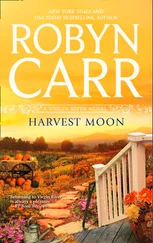1 ...7 8 9 11 12 13 ...16 She gave the wooden screened door a couple of polite taps.
“Come in, Nora,” Maxie said.
When she opened the door, Maxie was sitting at her kitchen table with her coffee and crossword puzzle. The yellow dog stood to greet her with a wagging tail. “Good morning, Mrs… . Maxie.”
The older woman smiled and Nora was momentarily mesmerized. She was truly beautiful with her thick white hair, bright healthy teeth and rosy cheeks. “Grab a cup,” Maxie said. “Sit with me a minute. Tell me about your weekend, about your sore shoulder and roughed-up hands.”
Nora dressed her coffee with cream, real cream, and sugar. She didn’t drink coffee at home—she didn’t have a pot and it was expensive. And cream? Forget about it! Then she sat across from Maxie. “Everything feels great. I’m still wearing the gloves and using the goop—I don’t want any trouble. I want the next chance at overtime.”
Maxie laughed. “And the shoulder?”
“So much better,” she said, rotating it to demonstrate. “I’m kind of embarrassed that I didn’t know about something as simple as anti-inflammatory and ice. But I’ve never done this kind of work before.”
“What kind of work did you do?”
“I waitressed in high school and worked part-time in a college bookstore. And then I became a mother.”
“Yes, how are the little ones? And who’s watching them for you?”
“The girls are absolutely fine—smart, good-natured, energetic. And one of my neighbors, Adie Clemens, sits with them until day care opens, then she walks them down the street. Adie is an older lady and not a ball of fire, if you get my drift. But she and the girls get along beautifully. And she wants to do this.”
Maxie chuckled. “I know Adie. I’ve known her a long time—she’s always been a little on the fragile side. We’re about the same age, I think. She’s a lovely woman.”
Nora’s mouth dropped open. The same age? Maxie was vibrant, strong and energetic. Adie seemed frail. Health problems and old age must have taken their toll, not to mention the rigors of poverty. Yet another reason to get ahead of this rough patch, Nora thought. “She is lovely,” Nora finally said. “So sweet. She loves my little girls. I’m so lucky.”
“And how are you getting along here, at the orchard?” Maxie asked.
“I’m not as fast as the men, but I bet I’ll catch up. I’m very determined.”
“And is Tom treating you well?”
She glanced away briefly before she could stop herself. She looked back instantly. “He gave me a ride from the crossroad this morning,” she said.
“I know. I had an idea that’s what he was up to when he drove out of here so early. There’s no reason for him to go anywhere before dawn.”
“I told him it wasn’t necessary,” Nora said quickly. “I like walking. I do.”
“You should probably carry a weapon of some kind if you’re walking through the forest before dawn. It’s a rare thing that a human is attacked by a cat or bear, but it’s been known to happen. Sunrise and sunset are busy times for the wildlife—on their way to breakfast or off to bed, thinking they’re all alone… .”
Hah, she thought. She’d never spend money on a gun when she had children to feed and protect. “It was thoughtful of Tom,” she said instead.
“How do you get along with him? Is he giving you trouble?”
She thought about her answer before saying, “I think I annoy him. I think he sees me as a burden, someone he’s forced to look after.”
“It’s probably not so much that as Tom getting used to his new role here. He was raised on this orchard and knows the ropes, but he’s been away. He spent the past several years in the Marine Corps. Two of those years he was deployed, first to Iraq and then to Afghanistan. He separated from the military after his second deployment—there were a lot of casualties in his command, I gather. I’ve noticed a kind of impatience in him that wasn’t there before. Sometimes I catch him brooding and I wonder—has he lost good friends? Comrades? Taking and giving orders—that’s not really the way we’ve been running this business, but that’s what Tom was used to in the military. We’re all going to have to give him time to adjust, I think. I suppose he has issues. Combat issues.”
War? She hadn’t been watching television coverage, obviously, so was left to her imagination and what she’d heard. And what she’d heard people say was terrible! Even with all she’d been through, she couldn’t imagine the war in Afghanistan. She heard a couple of the apple pickers talking about how it had recently been the bloodiest month in Afghanistan so far with the loss of sixty-five soldiers.
And although life had held challenges, incredibly difficult challenges, she and the babies had enough to eat, were safe and warm, healthy. She vowed to never complain.
“Oh, of course,” she said softly. “I had no idea. What could possibly be worse than war? Well, don’t worry, Maxie. He seems perfectly normal to me. He’s been very kind to me. If he’s a little impatient sometimes, I suppose there’s very good reason.”
“One of these days, maybe on a weekend, I’d love to have you and the little girls come to the house. We could include Adie. I’d love to meet them. I hardly ever get to be around little girls. I had a son, then a grandson.”
“That’s so lovely, but I don’t have anything like car seats,” Nora said. “No car, no car seats.”
“I know. Don’t worry about that right now—I would never transport your children without them.”
“That’s very kind of you but you—”
“It’s completely selfish, Nora. I love children. Especially little girls. I hope that fool grandson of mine does something about that before I die.”
* * *
Nora had a great little chat with Maxie but she had to remind herself that they weren’t friends. Maxie owned the orchard; Maxie was her employer. Maxie and Tom. “Are there any other family members?” she asked Buddy when they were dumping their apples one afternoon.
“Nope, that’s it. I hear she raised Tom since he was a baby, but I don’t know anything about why and Maxie’s husband died around ten years ago or so. There’s Junior—the foreman. He’s been on this orchard as long as I can remember, since I was a little kid. He must be just about family.” Then Buddy laughed. “Anyone Maxie cares about is usually considered family. When you know her a little better, you’ll get that.”
“I think I already get that,” she said, thinking of this woman wanting to bring her girls and Adie out for an afternoon, though she hardly knew Nora at all.
This revelation about Tom Cavanaugh caused her to look at him a bit differently. Over the next week she found herself thinking about him and keeping an eye open to catch sight of him. While she was up in the branches of the taller apple trees, on top of her tripod ladder, she would occasionally see him and she could stare without being obvious. He spent a lot of time working with Junior, a big, muscled man of about fifty; they laughed together while they worked. And while Tom loaded large crates of apples into a delivery truck to take to grocers, straining his muscles, she couldn’t help but admire his physique. He dressed the same every day, jeans, boots, his work shirt with the Cavanaugh Apples logo over the left breast pocket, sleeves rolled up, a whisper of soft brown hair on his forearms. His hands were very big and as she could attest, rough with calluses. The muscles of his upper arms, shoulders, back and legs moved under the fabric; that perfect male butt in jeans that weren’t too loose or too tight drew her eyes. Sometimes he seemed to get a little worn out—the tendons in his neck stood out and after putting a crate in the truck, he’d stop to wipe his brow. Then he’d laugh with one of the guys.
Читать дальше












